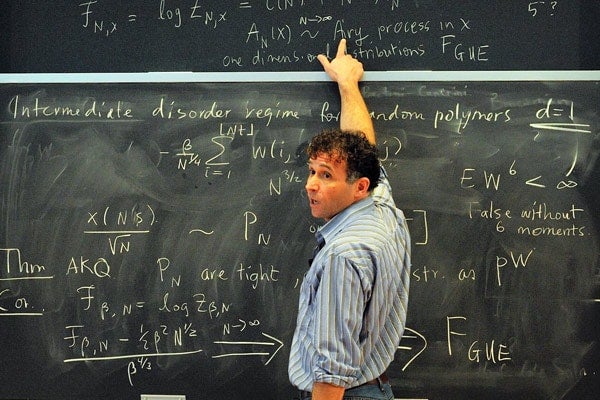
Jeremy Quastel, leading mathematician
Published: April 8, 2013
Professor Jeremy Quastel's groundbreaking research involves stochastic processes and partial differential equations.
These may sound like difficult, technical terms, but the concepts they attempt to describe are built on natural processes of change and evolution that we find everywhere in nature.
The Canada Council for the Arts recognizes the importance of this work and has awarded Quastel a Killam Research Fellowship -- funding that will provide $70,000 each year for two years to support his work to decipher these processes and describe them mathematically.
U of T has received 121 Killam Research Fellowships since they were established in 1965 to honour eminent Canadian scholars and scientists engaged in research projects of outstanding merit in the humanities, social sciences, natural sciences, health sciences, engineering and interdisciplinary studies within these fields. And U of T faculty comprise half of this year's Killam Research Fellows.
Quastel joins chemistry professor Mark Lautens who is developing more effective and environmentally sound pharmaceuticals, and linguistics professor Sali Tagliamonte whose work explores the evolution of Canadian English.
U of T News asked Quastel for a glimpse into the world of probability and random growth.
Tell us about your research.
My research is in probability, in particular on stochastic partial differential equations. These equations describe physical systems when the environment is random in some way.
For example, the one I am studying now, the Kardar-Parisi-Zhang equation, describes how random interfaces evolve, like perhaps a burning piece of paper, or the edge of a bacterial colony, or the phase boundaries in a liquid crystal. The nice thing is that the one equation describes all sorts of different physical problems. That's called universality, and it's one of the things we hope to understand, like the fact that the Gaussian probability distribution universally describes the sum of a lot of little independent things, which is the cornerstone of modern statistics.
The probability distributions that arise in random growth are sort of the analogue for problems where the noise has gone through certain types of non-linear transformations. They were first discovered in random matrix models and it is not so clear yet why the same ones are popping up in random growth models.
Maybe it would be simpler to ask what kind of impact this research might have for society?
Mathematics is behind a lot of the technology we use every day, for example the encryption codes that allow us to send information securely over the internet, the transforms that make MRIs possible, the data compression which lets you stream movies on your computer, or the stochastic models which make modern finance and insurance possible.
Random matrices were developed to model the spectra of large atoms; now they are being used in multivariate statistics.
This research on random growth models may find applications, in say, the manufacture of materials. And the techniques for non-linear equations could help provide better models, e.g. for climate.
In fact, most of the applications of mathematics that I mentioned had actually been developed to solve completely different problems. What you develop here, turns out, unexpectedly, to be useful over there. So the important thing is to develop a rich mathematical and scientific culture in Canada, and for this, it is essential to have strong fundamental research.
What drew you to this field – and to this particular focus?
One of the nice things about probability, which drew me to the field, is that it has stayed very close to real world applications, but at the same time the mathematics is deep and interesting. It's becoming more and more central in mathematics. Many of the recent Fields medals were connected in some way to probability.
Why U of T?
The mathematics department at the University of Toronto has a dynamic research environment, and an emphasis on excellence which attracted me here, and we've been able to build a very active group in probability from scratch in the last ten years. The students here are also unusually serious, mature and from diverse backgrounds, and I really appreciate that.
What advice would you give to a student just starting out in this field?
I think it's good to try to start with the problems one would like to solve, and then look for ways to solve them, as opposed to starting with the technique one has learned and then try to see what can be done with it. It's true that you might fail, but once in a while you get lucky!
And sometimes even the failures become successes. My main advice to young people in science is to concentrate on things they really feel are worth doing.



